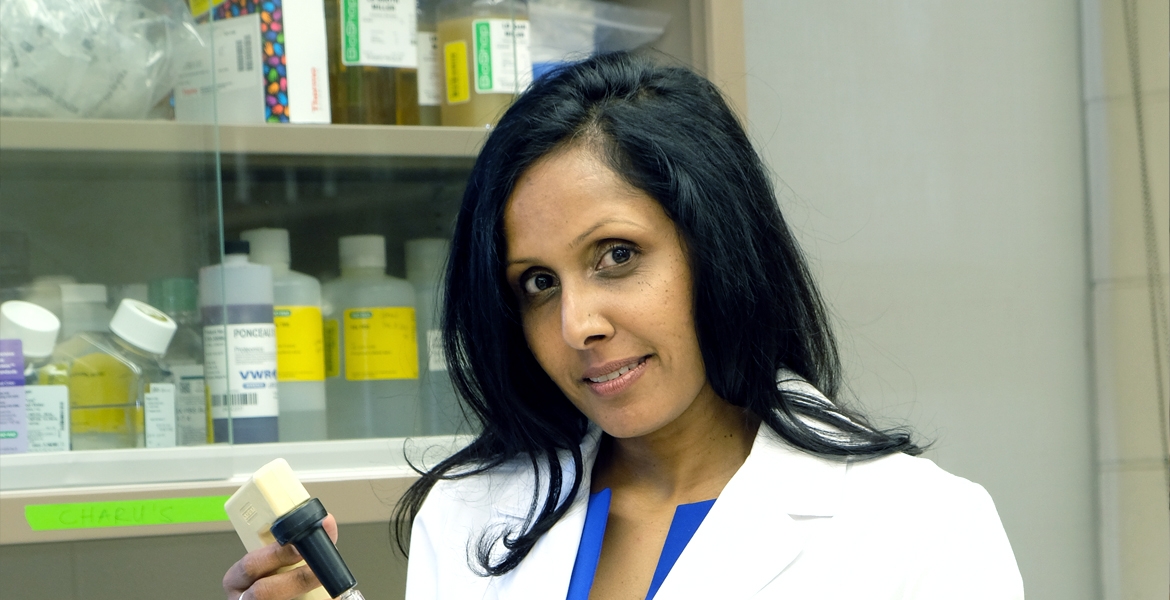
The largest philanthropic gift for research in UWindsor history was announced today in support of the Canadian Centre for Alternatives to Animal Methods (CCAAM), dedicated to the development of alternative approaches to the use of animals in scientific testing.
A $1 million donation from the Eric. S. Margolis Family Foundation will fund the establishment of the CCAAM research and training laboratory, as well as research and academic program development. In recognition of this gift, the centre’s main research and training laboratory will be named the Eric S. Margolis Research and Training Laboratory for Alternatives to Animal Methods.
Margolis was an internationally syndicated journalist and former owner and chair of Jamieson Laboratories. His focus is now on animal welfare issues.
“When 21st century technology is used to further medical research and chemical safety testing, the result is the Canadian Centre for Alternatives to Animal Methods,” Margolis says. “This next chapter will place our country on the forefront of future medical discoveries and safety testing and I am honoured to play an integral part in its inception.”
Charu Chandrasekera, the centre’s founding executive director, says that in spite of the fact that millions of animals are used annually in Canadian medical research and chemical safety testing, a growing body of scientific evidence indicates that the rate of congruence between animals and humans is at an all-time low.
“There is a tremendous need to focus on human biology-based approaches to study human disease and health impacts,” she says. “Many countries — including the United States — have already established national centres to advance non-animal methodologies, but CCAAM is the first and only centre of its kind in Canada.
“I am deeply grateful to Eric and Dana Margolis for their transformative gift that will catalyze our human-centered research, academic, and regulatory testing initiatives and enable us to thrust Canada into the global alternatives arena.”
Faculty of Science dean Chris Houser says work taking place in the centre will make the University of Windsor a leader in non-animal, human-centered research.
“This unprecedented gift for research will enable us to expedite the development of novel non-animal approaches,” says Dr. Houser. “I am particularly excited about the opportunities that this gift provides for our students, and knowing that the centre will train the next generation of scientists, health professionals, and policy makers in animal replacement methods to build viable, healthy, and safe communities.”
The University of Windsor owes a debt of gratitude to Eric and Dana Margolis for their unprecedented efforts to explore new horizons in research, said UWindsor vice-president research and innovation, K. W. Michael Siu.
“I am absolutely thrilled by this amazing gift. The Eric S. Margolis Family Foundation’s incredible generosity has enabled us to further pursue our continuing commitment to replace, reduce, and refine animal-based research,” he says. “There is no doubt in my mind that their contribution will allow CCAAM, the first Canadian centre for alternatives to animal methods, to achieve and exceed this objective.”
UWindsor president Douglas Kneale says scientists have acknowledged the pragmatic and ethical limitations to animal-based research and have turned their attention to human-centred research as an alternative method: “And with alternative methods come not just new ways of thinking but new ways of doing. This transformative gift by the Eric S. Margolis Family Foundation will give life to these new ways for both our students and our researchers.”